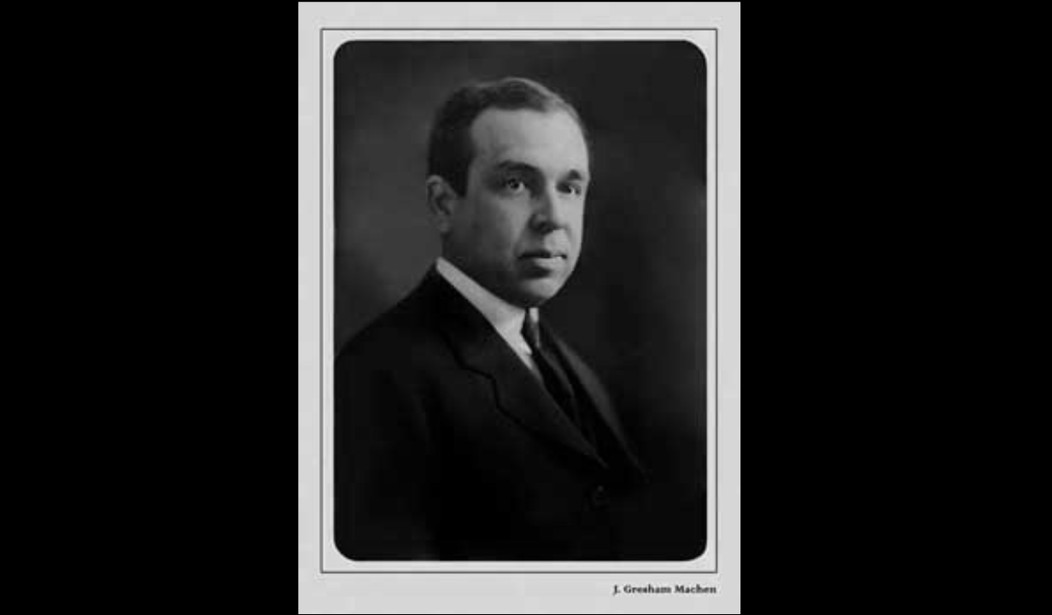I don’t remember how it came to my attention, but last summer, I downloaded the audiobook of J. Gresham Machen’s Christianity and Liberalism. I know, I know; it’s not exactly breezy summer reading (or listening), but I definitely don’t regret it. It’s worth pointing out that this year is the 100th anniversary of this landmark work.
Machen, an evangelical scholar at Princeton, wrote Christianity and Liberalism because he believed that “the chief modern rival of Christianity is Liberalism.” The book stemmed from the rising tide of liberal theology that was only growing in the early 1920s. Machen saw how liberalism was seeping into his beloved Princeton Theological Seminary, and that phenomenon alarmed him. He and others would go on to found Westminster Theological Seminary a few years later in an attempt to counter the liberalism at Princeton with biblical orthodoxy.
It’s astonishing how timely Machen’s words are a century later. In Christianity and Liberalism, “Machen combats liberal theology that crept into the once conservative Princeton Seminary with surgeon-like precision,” writes blogger Kevin Halloran. “His main thesis being that liberal Christianity is diametrically opposed to true, biblical Christianity.”
Halloran adds that Machen “destroys liberal thought with Scripture and logic while calling all men to true faith in the Savior and biblical faithfulness.”
I read or listen to a lot of books about theology, Bible scholarship, and Christian living, but few books have stopped me in my tracks the way this one did. I found myself stopping the audio on my iPhone plenty of times and just going, “Wow.” In so many ways, it seemed like Machen was writing this book today, even though the style fits the writing of 100 years ago.
Machen reminds his readers that it’s important for Christians to know what Christianity truly is. “Christianity cannot subsist unless men know what Christianity is; and the fair and logical thing is to learn what Christianity is, not from its opponents, but from those who themselves are Christians,” he writes.
He also notes that the modern age — in 1923 just as in 2023 — tries to make sense of how Christian faith fits into the culture. “What is the relation between Christianity and modern culture; may Christianity be maintained in a scientific age?” Machen writes. “It is this problem which modern liberalism attempts to solve.”
He notes how liberal Christians ignore what the Bible clearly notes as sin (see how timely it is?) when he writes, “Without the consciousness of sin, the whole of the gospel will seem to be an idle tale. But how can the consciousness of sin be revived? Something no doubt, can be accomplished by the proclamation of the law of God, for the law reveals transgressions. The whole of the law, moreover, should be proclaimed.”
Related: ‘Woke Jesus’ Is Not Jesus at All
One of the most powerful points in the book is when Machen points out how liberal Christians cherry-pick certain things from the Bible to hold up as examples of how to live while ignoring others. The phenomenon of the “Red-Letter Christians” who say we should only live by the direct quotes of Jesus and then twist those words to fit a leftist agenda, is a prime modern example.
Machen writes:
The truth is that the life-purpose of Jesus discovered by modern liberalism is not the life purpose of the real Jesus, but merely represents those elements in the teaching of Jesus — isolated and misinterpreted — which happen to agree with the modern program. It is not Jesus, then, who is the real authority, but the modern principle by which the selection within Jesus’ recorded teaching has been made. Certain isolated ethical principles of the Sermon on the Mount are accepted, not at all because they are teachings of Jesus, but because they agree with modern ideas.
What’s particularly astounding is that Machen tackles a few cultural and political issues as well in Christianity and Liberalism. His views on education might lead you to believe that he had a time machine and transported himself to the present day:
Place the lives of children in their formative years, despite the convictions of their parents, under the intimate control of experts appointed by the state, force them to attend schools where the higher aspirations of humanity are crushed out, and where the mind is filled with the materialism of the day, and it is difficult to see how even the remnants of liberty can subsist.
And another gem:
A public-school system, if it means the providing of free education for those who desire it, is a noteworthy and beneficent achievement of modern times; but when once it becomes monopolistic it is the most perfect instrument for tyranny which has yet been devised. Freedom of thought in the middle ages was combated by the Inquisition, but the modern method is far more effective.
These quotes are just a sampling of the wisdom and blistering critique of liberal Christianity that Machen offers in Christianity and Liberalism. Later last year, I read an interesting and more modern companion piece to Machen in Alisa Childers’ Another Gospel, where she takes on progressive Christianity based on her experiences in a left-leaning church that led her to question her faith.
As Christians, it’s important for us to discern the truth of our faith and stand against the liberal theologians, pastors, and churches who would try to undermine it for a left-wing agenda. Start with your Bible, of course, but books like Christianity and Liberalism go a long way toward helping believers understand Christianity. It’s a quick read and worth your time.










Join the conversation as a VIP Member